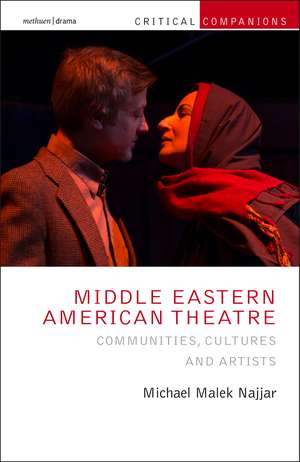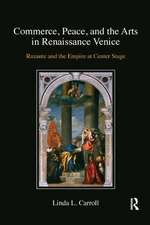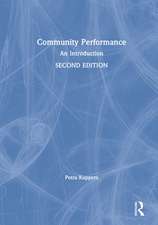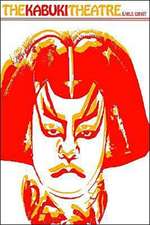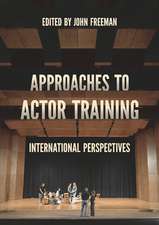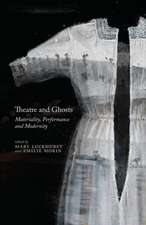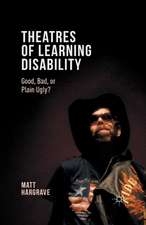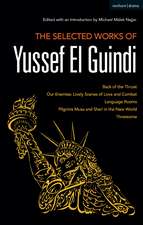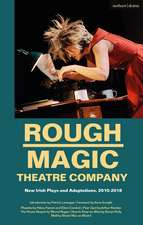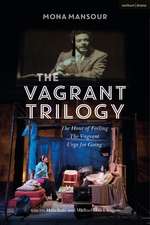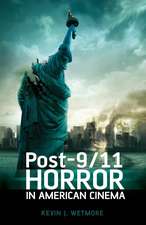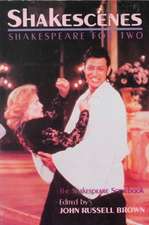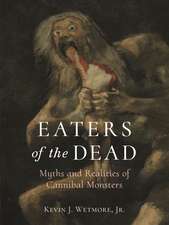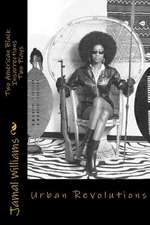Middle Eastern American Theatre: Communities, Cultures and Artists: Critical Companions
Autor Professor Michael Malek Najjar Kevin J. Wetmore, Jr., Patrick Lonerganen Limba Engleză Paperback – 24 aug 2022
| Toate formatele și edițiile | Preț | Express |
|---|---|---|
| Paperback (1) | 196.96 lei 6-8 săpt. | |
| Bloomsbury Publishing – 24 aug 2022 | 196.96 lei 6-8 săpt. | |
| Hardback (1) | 538.52 lei 6-8 săpt. | +113.45 lei 7-13 zile |
| Bloomsbury Publishing – 10 feb 2021 | 538.52 lei 6-8 săpt. | +113.45 lei 7-13 zile |
Din seria Critical Companions
- 13%
 Preț: 235.71 lei
Preț: 235.71 lei - 14%
 Preț: 165.48 lei
Preț: 165.48 lei - 14%
 Preț: 178.93 lei
Preț: 178.93 lei - 23%
 Preț: 172.01 lei
Preț: 172.01 lei -
 Preț: 180.44 lei
Preț: 180.44 lei - 30%
 Preț: 508.87 lei
Preț: 508.87 lei - 11%
 Preț: 178.96 lei
Preț: 178.96 lei - 14%
 Preț: 179.10 lei
Preț: 179.10 lei - 23%
 Preț: 172.27 lei
Preț: 172.27 lei - 19%
 Preț: 166.07 lei
Preț: 166.07 lei - 30%
 Preț: 537.95 lei
Preț: 537.95 lei - 14%
 Preț: 178.22 lei
Preț: 178.22 lei - 22%
 Preț: 655.67 lei
Preț: 655.67 lei - 13%
 Preț: 187.26 lei
Preț: 187.26 lei - 22%
 Preț: 598.84 lei
Preț: 598.84 lei - 13%
 Preț: 179.98 lei
Preț: 179.98 lei - 20%
 Preț: 145.55 lei
Preț: 145.55 lei - 30%
 Preț: 567.17 lei
Preț: 567.17 lei - 13%
 Preț: 180.88 lei
Preț: 180.88 lei - 22%
 Preț: 538.67 lei
Preț: 538.67 lei - 22%
 Preț: 598.84 lei
Preț: 598.84 lei - 14%
 Preț: 177.84 lei
Preț: 177.84 lei - 14%
 Preț: 179.98 lei
Preț: 179.98 lei - 14%
 Preț: 178.65 lei
Preț: 178.65 lei - 22%
 Preț: 568.80 lei
Preț: 568.80 lei - 19%
 Preț: 179.56 lei
Preț: 179.56 lei - 22%
 Preț: 655.67 lei
Preț: 655.67 lei - 14%
 Preț: 179.56 lei
Preț: 179.56 lei - 30%
 Preț: 596.00 lei
Preț: 596.00 lei - 13%
 Preț: 180.52 lei
Preț: 180.52 lei - 14%
 Preț: 172.74 lei
Preț: 172.74 lei - 13%
 Preț: 179.98 lei
Preț: 179.98 lei
Preț: 196.96 lei
Preț vechi: 257.44 lei
-23% Nou
Puncte Express: 295
Preț estimativ în valută:
37.71€ • 39.34$ • 31.61£
37.71€ • 39.34$ • 31.61£
Carte tipărită la comandă
Livrare economică 12-26 martie
Preluare comenzi: 021 569.72.76
Specificații
ISBN-13: 9781350192591
ISBN-10: 1350192597
Pagini: 256
Ilustrații: 5 bw illus
Dimensiuni: 138 x 216 mm
Greutate: 0.3 kg
Editura: Bloomsbury Publishing
Colecția Methuen Drama
Seria Critical Companions
Locul publicării:London, United Kingdom
ISBN-10: 1350192597
Pagini: 256
Ilustrații: 5 bw illus
Dimensiuni: 138 x 216 mm
Greutate: 0.3 kg
Editura: Bloomsbury Publishing
Colecția Methuen Drama
Seria Critical Companions
Locul publicării:London, United Kingdom
Caracteristici
Provides a deeper understanding of the Middle East and its cultures by combining historical survey with chapters devoted to particular groups and a focus on key artists and their works
Notă biografică
Michael Malek Najjar is an associate professor of Theatre Arts at the University of Oregon, USA with a specialization/ concentration in Arab American and Middle Eastern American Theatre forms. He is the author of Middle Eastern American Theatre: Communities, Cultures and Artists and Arab American Drama, Film and Performance, 1908 to the Present. He is the editor of Heather Raffo's Iraq Plays: The Things That Can't Be Said, The Selected Works of Yussef El Guindi, Four Arab American Plays: Works by Leila Buck, Jamil Khoury, Yussef El Guindi, and Lameece Issaq & Jacob Kader and co-editor of Six Plays of the Israeli-Palestinian Conflict. He is on the advisory board of Arab Stages and the steering committee of MENA Theatre Makers Alliance.
Cuprins
List of IllustrationsAcknowledgementsPrefaceIntroduction: Polyculturalism, Transnationalism, and Diaspora1 Major Middle Eastern American Companies 2 Return to the Homeland Plays3 Persecution Plays Governmental Persecution: Back of the Throat; Truth Serum Blues; Zafira and the Resistance Societal Persecution: Autobiography of a Terrorist; Me No Terrorist; Roar; Mosque Alert; Lubbock or Leave It!4 Diaspora Plays Middle Easterners in the Entertainment Industry: It's Not About Pomegranates! and Browntown Living Between "Here" and "There": 444 Days; This Time; Twice, Thrice, Frice.; Reading Hebron; Noura; Dragonflies; Suitcase; Living in the Hyphen-Nation Keeping Tradition Alive: TRAF; A People: A Mosaic Play; Detour Guide Searching for Roots: Baba and (dis)Place[d] Diaspora and Its Discontents: Stunning, Deep Cut, and The Man in the Sukkah5 Plays Set in the Homeland Plays Exploring the Refugee Crisis: Urge for Going, Not My Revolution Holocaust Plays and Plays Set in Israel and Palestine: The Zionists, Abraham's Daughters, and Food and Fadwa Plays and Musicals About the Troubled Homeland: Pera Palas, The Band's Visit, and We Live in Cairo6 Conflict Plays The Palestinian-Israeli Conflict: The River and the Sea; Abraham's Daughters, Facts, Martyr's Street, Wrestling Jerusalem Plays of the Armenian Genocide: March!; Night Over Erzinga Civil War Plays: Scorched; Game of Patience; Smail7 The Current State of Middle Eastern American Theatre8 Critical Perspectives "Theatre that Disrupts Our Unconscious Bias with Humor and Joy": An Interview with Maia Directors Kareem Fahmy, Evren Odcikin, Megan Sandberg-Zakian, and Pirronne Yousefzadeh "Be a Part of Changing the American Narrative About the Middle East": An interview with Golden Thread Productions Artistic Director Torange Yeghiazarian and Silk Road Rising Artistic Director Jamil Khoury.References and Further ReadingNotes on ContributorsIndex
Recenzii
Professor Najjar's comprehensive examination is an inspiring reminder of how far the Middle Eastern Theatre community has advanced, and is a call to all theatre artists who identify as Middle Eastern American to make their voices heard. His book is a much-needed illumination of the diversity of the US American theatre-and of the Middle Eastern American theatre community itself, composed as it is of writers, directors, actors, designers, educators and producers of many national origins and religions, whose stories are an essential part of the American landscape. It will hopefully serve as a point of departure for many such writings and conversations and expand the perception of people of Middle Eastern origin and our relationship to our heritage.
Najjar's thoughtful analysis captures the stylistic and thematic diversity of the theatre practice of Americans of Middle Eastern descent. The region is home to dozens of ethnicities, religions, and national traditions, and-as Najjar demonstrates-the theatre's grappling with the past and present of the region and its diasporas has produced gripping art. Najjar provides a clear and engaging overview of a remarkably vast, varied, and compelling theatre.
Najjar's thoughtful analysis captures the stylistic and thematic diversity of the theatre practice of Americans of Middle Eastern descent. The region is home to dozens of ethnicities, religions, and national traditions, and-as Najjar demonstrates-the theatre's grappling with the past and present of the region and its diasporas has produced gripping art. Najjar provides a clear and engaging overview of a remarkably vast, varied, and compelling theatre.
